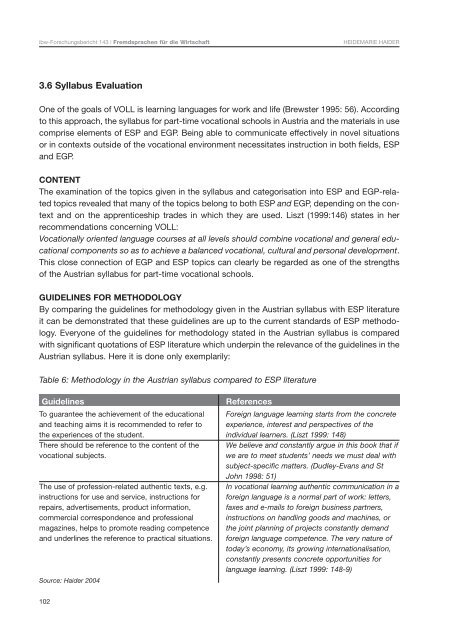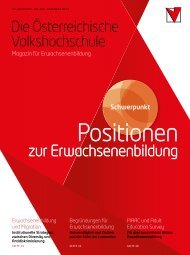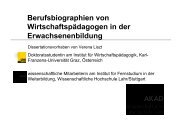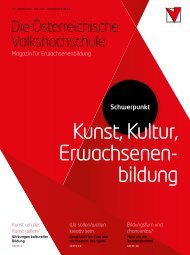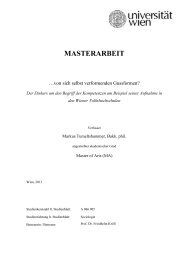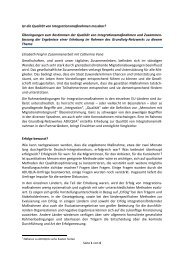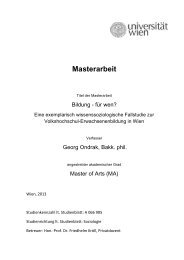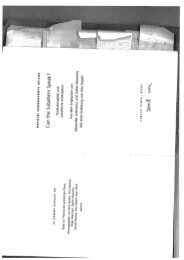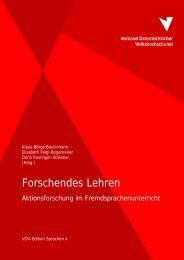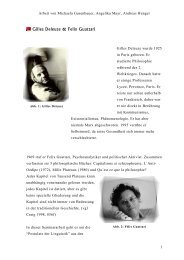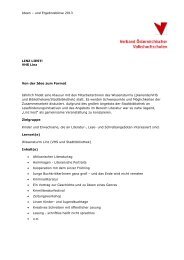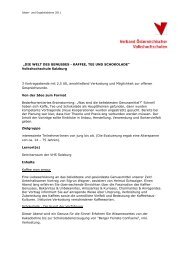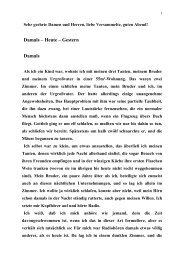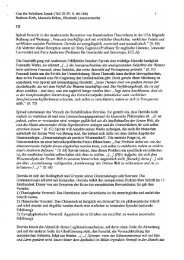Der sichere Umgang mit fremden Sprachen und Kulturen stellt heute ...
Der sichere Umgang mit fremden Sprachen und Kulturen stellt heute ...
Der sichere Umgang mit fremden Sprachen und Kulturen stellt heute ...
Sie wollen auch ein ePaper? Erhöhen Sie die Reichweite Ihrer Titel.
YUMPU macht aus Druck-PDFs automatisch weboptimierte ePaper, die Google liebt.
ibw-Forschungsbericht 143 | Fremdsprachen für die Wirtschaft HEIDEMARIE HAIDER<br />
3.6 Syllabus Evaluation<br />
One of the goals of VOLL is learning languages for work and life (Brewster 1995: 56). According<br />
to this approach, the syllabus for part-time vocational schools in Austria and the materials in use<br />
comprise elements of ESP and EGP. Being able to communicate effectively in novel situations<br />
or in contexts outside of the vocational environment necessitates instruction in both fields, ESP<br />
and EGP.<br />
CONTENT<br />
The examination of the topics given in the syllabus and categorisation into ESP and EGP-related<br />
topics revealed that many of the topics belong to both ESP and EGP, depending on the context<br />
and on the apprenticeship trades in which they are used. Liszt (1999:146) states in her<br />
recommendations concerning VOLL:<br />
Vocationally oriented language courses at all levels should combine vocational and general educational<br />
components so as to achieve a balanced vocational, cultural and personal development.<br />
This close connection of EGP and ESP topics can clearly be regarded as one of the strengths<br />
of the Austrian syllabus for part-time vocational schools.<br />
GUIDELINES FOR METHODOLOGY<br />
By comparing the guidelines for methodology given in the Austrian syllabus with ESP literature<br />
it can be demonstrated that these guidelines are up to the current standards of ESP methodology.<br />
Everyone of the guidelines for methodology stated in the Austrian syllabus is compared<br />
with significant quotations of ESP literature which <strong>und</strong>erpin the relevance of the guidelines in the<br />
Austrian syllabus. Here it is done only exemplarily:<br />
Table 6: Methodology in the Austrian syllabus compared to ESP literature<br />
Guidelines References<br />
To guarantee the achievement of the educational Foreign language learning starts from the concrete<br />
and teaching aims it is recommended to refer to experience, interest and perspectives of the<br />
the experiences of the student. individual learners. (Liszt 1999: 148)<br />
There should be reference to the content of the We believe and constantly argue in this book that if<br />
vocational subjects. we are to meet students’ needs we must deal with<br />
subject-specific matters. (Dudley-Evans and St<br />
John 1998: 51)<br />
The use of profession-related authentic texts, e.g. In vocational learning authentic communication in a<br />
instructions for use and service, instructions for foreign language is a normal part of work: letters,<br />
repairs, advertisements, product information, faxes and e-mails to foreign business partners,<br />
commercial correspondence and professional instructions on handling goods and machines, or<br />
magazines, helps to promote reading competence the joint planning of projects constantly demand<br />
and <strong>und</strong>erlines the reference to practical situations.<br />
Source: Haider 2004<br />
foreign language competence. The very nature of<br />
today’s economy, its growing internationalisation,<br />
constantly presents concrete opportunities for<br />
language learning. (Liszt 1999: 148-9)<br />
102


